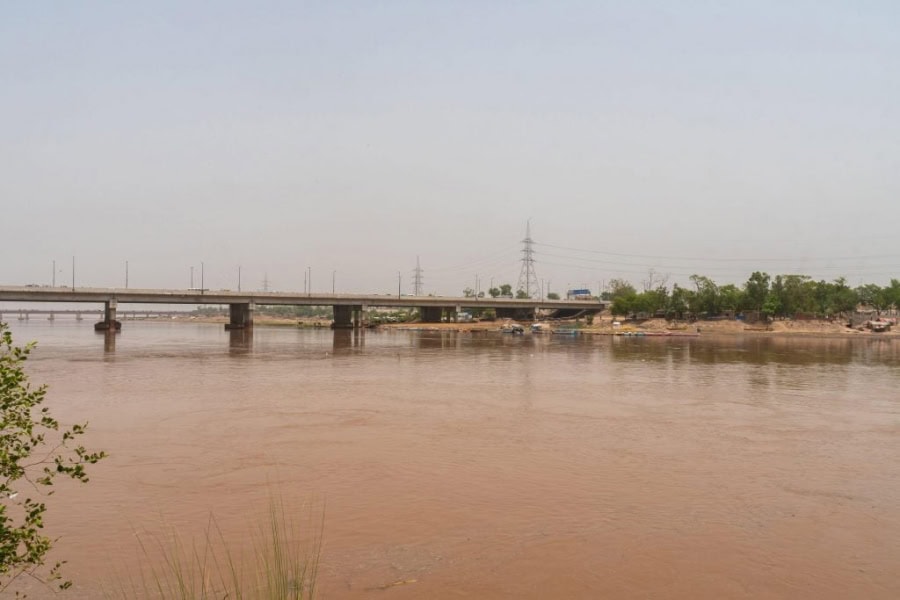Samra Aslam
In the blatant violation of International Law, India has once again indulged in to Water Terrorism against Pakistan by constructing Shahpur Kandi Barrage on River Ravi that will completely block water flow to Pakistan.
Ever since the partition, India has consistently displayed a malevolent nature, making deliberate efforts to cause harm to Pakistan. One of the most striking examples of its malice is its deliberate action of withholding river water from Pakistan, a fundamental necessity for sustaining life.
In 1995 the foundation of Shahpur Kandi Barrage on the river Ravi was laid but due to uncertainty within the Indian Government the project was delayed. Recently, with the completion of this barrage India will retain 1150 cusecs of water previously destined for Pakistan.
Pakistan has longstanding water rights treaties with India, such as the Indus Waters Treaty of 1960, which directs the sharing of water resources between the two nations. Given the natural flow of water from India to Pakistan, any obstruction or blockade of this flow would have a substantial impact on Pakistan. Therefore, according to the 1960 treaty India was to engage in meaningful dialogue and consultation with Pakistan before proceeding with the construction of any barrages or dams.
India’s decision to halt the water flow from the Ravi River into Pakistan through the completion of the Shahpur Kandi Barrage will have severe repercussions for Pakistan. The consequences will include the drying up of Pakistan’s land and the subsequent death of crops. This, in turn, will result in a significant decline in food production within Pakistan, ultimately leading to a profound negative impact on the agricultural sector.
The natural flow of water from India to Pakistan through River Ravi is disrupted, violating the water rights of Pakistan. Pakistan relies on the Ravi River water for numerous purpose, agriculture being the first in priority. Pakistan’s economy heavily depends upon agriculture contributing approximately 24 percent to the country’s Gross Domestic Product (GDP) serving as a main source of income for many farmers.
Additionally, agriculture is the largest generator of foreign exchange earnings. Depriving a country which relies on agriculture, of water, can have a profound impact on its overall economic status.
Not only agriculture but the reduced water flow can also affect domestic water supply, leading to shortage of water for the communities, which would further affect public health and sanitation. This infringement on Pakistan’s access to water resources can have serious socio-economic implications. Additionally, altering the natural flow of the river can disrupt ecosystems and habitats, affecting biodiversity and potentially leading to adverse ecological consequences.
India had harbored intentions of taking this step for a considerable period of time. During a rally in 2016, Prime minister of India Narendra Modi made a firm commitment to ensure that every drop of water from river Sutlej, Beas, and Ravi would reach Punjab and Jammu and Kashmir. He emphasized India’s exclusive authority over the water and pledged to take necessary measures to prevent any wastage by diverting it away from Pakistan into India.
Moreover, India has constructed various water management projects, including building storage facilities like the Bhakra Dam on the Sutlej, Pong and Pandoh Dam on the Beas, and Thein (Ranjitsagar) on the Ravi.
Moreover, through the projects like the Beas-Sutlej link and the Indira Gandhi Nahar Project India is retaining almost 95 percent of water from the eastern rivers.
Additionally, in January 2024, India under RSS led Hindutva regime has announced the diversion of Chenab River waters through diversion tunnels in Kishtwar district, Jammu and Kashmir that is a blatant violation of Indus Water Treaty.
The disruption of this water source due to the diversion not only poses challenges to the agricultural sector but also jeopardizes the daily needs and well-being of the affected population in Pakistan.
Bhartiya Janata Party (BJP), Rashtriya Swayamsevak Sangh (RSS), and infamous
Research and Analysis Wing (RAW) are clearly involved in planning water diversions and cyber hacking of Pakistan’s power grids to miff Pakistan.
Modi openly showed his intentions by saying, “water and blood cannot flow together” indicating that India is using the disguise of terrorism to cover its hostile actions to deprive Pakistan of the water resources.
India blatantly violated Indus Water Treaty, using legal loopholes to exploit water of western rivers and retaining water of eastern rivers beyond IWT conditions mainly to cause troubles for Pakistan.










